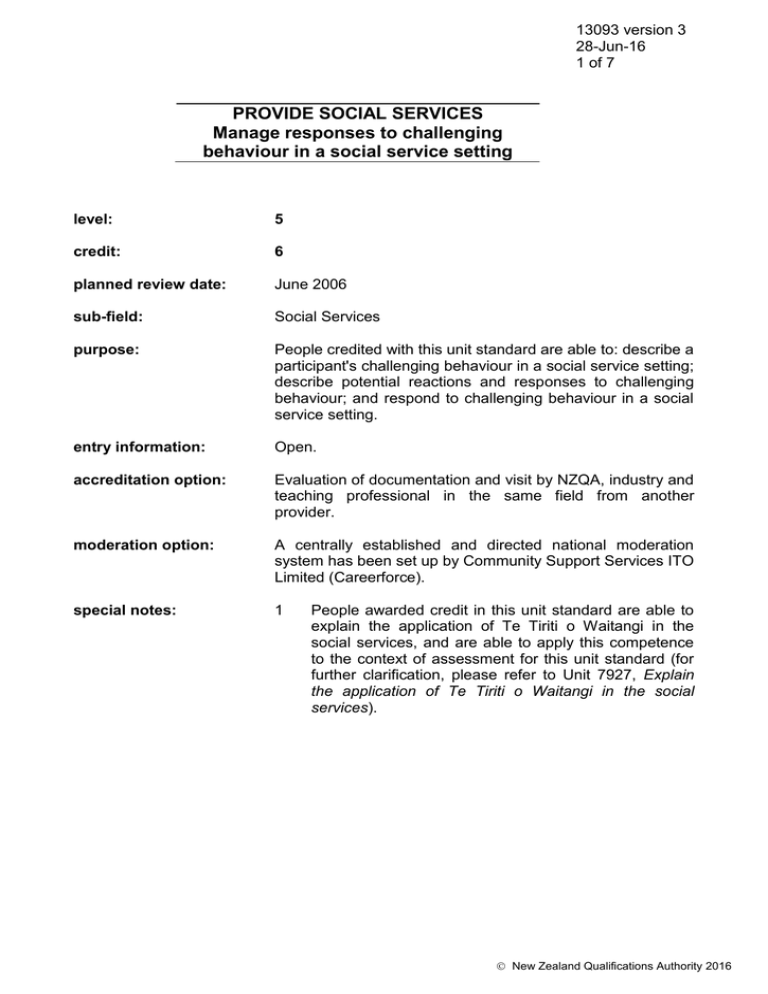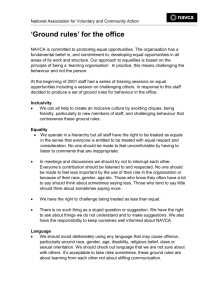
13093 version 3
28-Jun-16
1 of 7
PROVIDE SOCIAL SERVICES
Manage responses to challenging
behaviour in a social service setting
level:
5
credit:
6
planned review date:
June 2006
sub-field:
Social Services
purpose:
People credited with this unit standard are able to: describe a
participant's challenging behaviour in a social service setting;
describe potential reactions and responses to challenging
behaviour; and respond to challenging behaviour in a social
service setting.
entry information:
Open.
accreditation option:
Evaluation of documentation and visit by NZQA, industry and
teaching professional in the same field from another
provider.
moderation option:
A centrally established and directed national moderation
system has been set up by Community Support Services ITO
Limited (Careerforce).
special notes:
1
People awarded credit in this unit standard are able to
explain the application of Te Tiriti o Waitangi in the
social services, and are able to apply this competence
to the context of assessment for this unit standard (for
further clarification, please refer to Unit 7927, Explain
the application of Te Tiriti o Waitangi in the social
services).
New Zealand Qualifications Authority 2016
13093 version 3
28-Jun-16
2 of 7
PROVIDE SOCIAL SERVICES
Manage responses to challenging
behaviour in a social service setting
2
This unit standard may be assessed on the basis of
evidence of demonstrated performance in the work
place, or through the use of simulated work place
situations that closely approximate the performance
required in workplace settings. Evidence is required in
one actual workplace or in one simulated workplace
situation with one participant exhibiting challenging
behaviour. Work place settings can include field
education placements.
It is recommended that
assessment for this unit standard occur alongside
assessment for Unit 13094, Work towards resolution of
challenging behaviour in a social service setting.
3
Glossary
Challenging behaviour is behaviour that is inappropriate
in the participant's situation; inappropriate within the
values and context of the social service provider; and
inappropriate in the context of the professional
relationship, where it may be necessary for the social
service worker to challenge or confront the participant
or take some form of social service action in the
interests of the safety of the participant or others.
Examples of challenging behaviour include behaviour
that is: anti authority; criminal; behaviour resulting from
physical and mental conditions; cultural, gender, or
political challenge; defensiveness; self endangerment;
racial and sexual harassment; violence.
Characteristics and needs of a participant may be
physical, spiritual, or mental. Characteristics and needs
include: age and stage of development, beliefs, culture,
disability, gender, health status, language, sexual
orientation, values, and needs for physical comfort,
safety, and privacy.
Participant is used as a generic term to denote the
person who is demonstrating challenging behaviour.
He/she may be referred to by various descriptive terms
in the range of social service settings. He/she may be
an employer, manager, supervisor, co-worker, service
user, student, or a contact outside of the work place.
New Zealand Qualifications Authority 2016
13093 version 3
28-Jun-16
3 of 7
PROVIDE SOCIAL SERVICES
Manage responses to challenging
behaviour in a social service setting
Respond, response, and responses are used in this unit
standard to refer to considered or planned professional
actions, as opposed to behaviour which is instinctual
and non-considered. Professional responses connote
recognition of the worker's own reactions, which take
into account the nature of the interaction and the
philosophy and values of the social service
organisation, either consciously or as a result of action
and reflection. People awarded credit in this unit
standard demonstrate the ability to respond to
challenging behaviour with empathy, and without losing
their own perception of reality.
Violence includes "all forms of physical and nonphysical abuse, attack, threat or assault [that may be
emotional, physical, verbal, and/or sexual in nature,
and] has damaging physical or psychological effects
upon the person".
Acknowledgements: Bibby, P., compiler and editor.
1994. Personal Safety for Social Workers. England:
Arena Ashgate Publishing Company.
4
All communications are treated confidentially, except
where there is an ethical, legal, or organisational duty
on the social service worker to report abuse, neglect, or
violence. Participants are informed of the scope and
limits of confidentiality as defined by criteria established
by legislation, ethical practice, and service provider
guidelines. In the context of this unit standard, sources
of criteria established by legislation, ethical practice,
and service provider guidelines include, but are not
limited to: the Children, Young Persons and Their
Families Act 1989; Domestic Violence Act 1995 Section
43; Health Act 1956 Sections 22B and 22C; Official
Information Act 1982; Privacy Act 1993; service
provider codes of conduct, codes of practice issued by
the Privacy Commissioner, social service codes of
ethics, and service provider guidelines, protocols, staff
manuals, strategic plans, kawa, or tikanga.
New Zealand Qualifications Authority 2016
13093 version 3
28-Jun-16
4 of 7
PROVIDE SOCIAL SERVICES
Manage responses to challenging
behaviour in a social service setting
5
The person seeking credit in this unit standard is
referred to as a social service worker. Social service
workers include but are not limited to: community
workers, counsellors, kaiāwhina, social workers,
kaitautoko, youth workers, and others who deliver
social services, whether paid or unpaid.
6
People awarded credit in this unit standard show that
their actions are guided and supported by valid theory
for social service practice. Evidence is required of
social service theory that is derived from authoritative
sources, which may include but are not limited to: body
of knowledge related to social service work; cultural
theory; practice research.
Elements and Performance Criteria
element 1
Describe a participant's challenging behaviour in a social service setting.
performance criteria
1.1
The participant's challenging behaviour is described in terms of the definition of
challenging behaviour included in the Glossary of this unit standard.
Range:
1.2
evidence is required of definition of one challenging behaviour
from each section of the range.
The participant's challenging behaviour is analysed in terms of the necessity to
respond as a social service worker.
Range:
necessity to respond - legal responsibilities as a social service
worker, professional responsibilities as a social service worker,
safety considerations;
safety considerations - safety of self as a social service worker,
safety of the participant, safety of others who are significant to the
participant, public safety.
New Zealand Qualifications Authority 2016
13093 version 3
28-Jun-16
5 of 7
PROVIDE SOCIAL SERVICES
Manage responses to challenging
behaviour in a social service setting
element 2
Describe potential reactions and responses to challenging behaviour.
performance criteria
2.1
Potential reactions to challenging behaviour are identified and described in
terms of positive and negative reactions.
Range:
2.2
Potential reactions to challenging behaviour are identified and described in
terms of personal factors that have potential to impact on responses to
challenging behaviour.
Range:
2.3
positive reactions may include but are not limited to assertiveness; management of anxiety or fear; modelling
functional behaviour; calming responses;
negative reactions may include but are not limited to accommodation syndrome; collusion; counter transference;
hostage theory; lack of management of anxiety or fear; stress
reactions.
Evidence is required of description of two positive and two
negative potential reactions.
personal factors may include but are not limited to - difference in
ages and stages of development between the social service
worker and participant; differences in cultural, economic,
educational, gender, language, political, and social realities
between the social service worker and participant; self awareness;
transference; values.
Evidence is required of three personal factors.
Potential reactions to challenging behaviour are identified and described in
terms of professional responses that have potential to respond effectively to
challenging behaviour.
Range:
professional responses - non-intervention, minimal intervention, or
maximum intervention; referral or reporting to other statutory or
voluntary agencies; legal; physical; verbal; co-working with
another professional.
Evidence is required of three professional responses.
New Zealand Qualifications Authority 2016
13093 version 3
28-Jun-16
6 of 7
PROVIDE SOCIAL SERVICES
Manage responses to challenging
behaviour in a social service setting
element 3
Respond to challenging behaviour in a social service setting.
Range:
responses - non-intervention, minimal intervention, or maximum intervention;
referral or reporting to other statutory or voluntary agencies; legal; physical;
verbal; co-working with another professional.
Evidence is required of two of the range.
performance criteria
3.1
The responses to challenging behaviour are in accordance with the
characteristics and needs of the participant.
3.2
The responses are in accordance with their potential effectiveness to deal with
the challenging behaviour.
3.3
The responses model safe and respectful behaviour to the participant.
Range:
3.4
The responses to the challenging behaviour are in accordance with service
provider guidelines and professional responsibilities.
Range:
3.5
safe and respectful behaviour - authoritative rather than
authoritarian; non-aggressive rather than aggressive; proactive
rather than reactive.
professional responsibilities include - legal responsibilities,
timeliness, cultural considerations, safety considerations;
safety considerations - safety of self as a social service worker,
safety of the participant, safety of significant others, public safety.
Reflection on the responses identifies any positive and negative outcomes of
the responses.
New Zealand Qualifications Authority 2016
13093 version 3
28-Jun-16
7 of 7
PROVIDE SOCIAL SERVICES
Manage responses to challenging
behaviour in a social service setting
Comments to:
Careerforce
PO Box 2637
Wellington 6140
Please Note:
Providers must be accredited by the Qualifications Authority
before they can offer programmes of education and training
assessed against unit standards.
Accredited providers assessing against unit standards must
engage with the moderation system that applies to those unit
standards. [Please refer to relevant Plan ref: 0222]
New Zealand Qualifications Authority 2016


